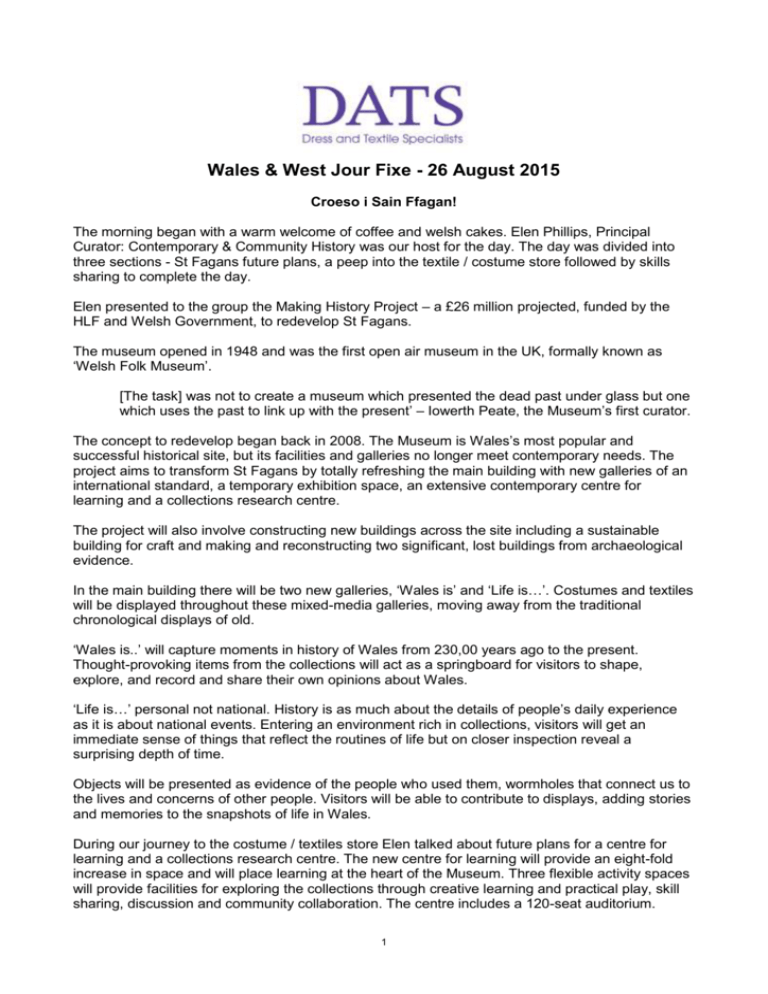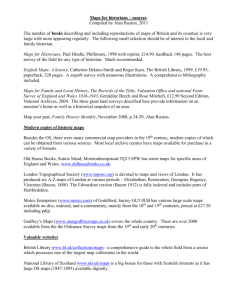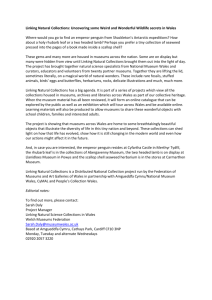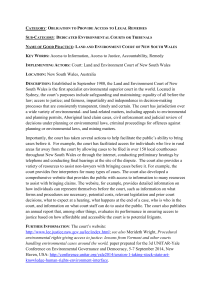COLLECTIONS MANAGEMENT TEAM MEETING
advertisement

Wales & West Jour Fixe - 26 August 2015 Croeso i Sain Ffagan! The morning began with a warm welcome of coffee and welsh cakes. Elen Phillips, Principal Curator: Contemporary & Community History was our host for the day. The day was divided into three sections - St Fagans future plans, a peep into the textile / costume store followed by skills sharing to complete the day. Elen presented to the group the Making History Project – a £26 million projected, funded by the HLF and Welsh Government, to redevelop St Fagans. The museum opened in 1948 and was the first open air museum in the UK, formally known as ‘Welsh Folk Museum’. [The task] was not to create a museum which presented the dead past under glass but one which uses the past to link up with the present’ – Iowerth Peate, the Museum’s first curator. The concept to redevelop began back in 2008. The Museum is Wales’s most popular and successful historical site, but its facilities and galleries no longer meet contemporary needs. The project aims to transform St Fagans by totally refreshing the main building with new galleries of an international standard, a temporary exhibition space, an extensive contemporary centre for learning and a collections research centre. The project will also involve constructing new buildings across the site including a sustainable building for craft and making and reconstructing two significant, lost buildings from archaeological evidence. In the main building there will be two new galleries, ‘Wales is’ and ‘Life is…’. Costumes and textiles will be displayed throughout these mixed-media galleries, moving away from the traditional chronological displays of old. ‘Wales is..’ will capture moments in history of Wales from 230,00 years ago to the present. Thought-provoking items from the collections will act as a springboard for visitors to shape, explore, and record and share their own opinions about Wales. ‘Life is…’ personal not national. History is as much about the details of people’s daily experience as it is about national events. Entering an environment rich in collections, visitors will get an immediate sense of things that reflect the routines of life but on closer inspection reveal a surprising depth of time. Objects will be presented as evidence of the people who used them, wormholes that connect us to the lives and concerns of other people. Visitors will be able to contribute to displays, adding stories and memories to the snapshots of life in Wales. During our journey to the costume / textiles store Elen talked about future plans for a centre for learning and a collections research centre. The new centre for learning will provide an eight-fold increase in space and will place learning at the heart of the Museum. Three flexible activity spaces will provide facilities for exploring the collections through creative learning and practical play, skill sharing, discussion and community collaboration. The centre includes a 120-seat auditorium. 1 Whilst in the textile store Elen gave an overview of the collection. We looked at the Wrexham Tailor’s Quilt – an outstanding inlaid patchwork bedcover made over a 10 year period (1842-52) by James Williams, a military tailor. We also viewed a court mantua of the early 1700s, supposedly worn by Lady Rachel Morgan of Tredegar House. After lunch Dewi Jones, Weaver, shared his wealth of knowledge and experience working at the Esgair Moel Woollen Mill. He has been working at the mill for over 20 years. The Mill is unique in that it is one of few places where most of the processes to produce cloth from Fleece to Fabric take place onsite. If you have any suggestions of places or collections you would like to visit in Wales & West please contact our representative for this region. All members of DATS are welcome to attend the visits / study days. On behalf of DATS Sarah would like to thank you the staff and Elen at St Fagans for their kind generous during our recent visit to St Fagans. Sarah Jane Kenyon, Wales & West Representative. 2







